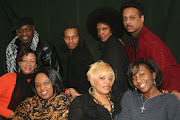By TOM ODULA
Associated Press
NAIROBI, Kenya (AP) - Six men were dead. On that, Kenyan police and a watchdog could agree. Then the narratives diverged, and sharply.
Police posted on Twitter that the six men had robbed a motorbike taxi driver and raped his passenger. Human rights activists quickly put together a different account from witnesses: Two of the dead were robbery suspects. The others apparently were killed by police for witnessing officers kill the two men.
As frustration in Kenya grows over alleged police abuses, the public has begun fighting back. They have formed the Dandora Social Justice Center and others to investigate what they say the government doesn't.
In low-income neighborhoods of the capital, Nairobi, police killings are common. Many cases have gone unreported with families suffering in silence, rights activists say. Rarely are perpetrators held accountable.
Police officers have been implicated in numerous reports by international rights groups and even Kenya's government-backed rights commission. A database kept by the local Nation newspaper says police killed 180 people in Kenya in the first nine months of 2018, the majority in Dandora.
Police counter the allegations of illegal killings by saying the rights groups are embellishing their reports to attract more donor funding.
The rise of social justice centers in Kenya in recent months has had an immediate impact.
The six deaths in October documented by the Dandora Social Justice Center were among 28 alleged killings by police documented over a month's time in Nairobi's low-income neighborhoods of Dandora, Mathare, Kayole and Githuria.
One of the witnesses killed was a 17-year-old boy who climbed a tree to hide from officers but was pulled down and shot dead, said Beth Mukami with the social justice center.
The center's account of the police killings was given to the Independent Police Oversight Authority, a civilian oversight group with the mandate of investigating police abuses. The authority says it received 288 complaints in 2018 of deaths and serious injuries allegedly committed by members of Kenya's National Police Service.
The social justice groups have become a critical partner, said Dennis Oketch, spokesman for the authority. The groups work quickly on the ground, flagging cases when the crime scene is still fresh and witnesses are still available, he said. The groups also hold the authority accountable by following up on cases, he added.
Wilfred Olal, who co-founded the idea of social justice groups, said the idea started about two years ago during discussions in a civil society group known as the People's Parliament.
"The communities come together, do research on matters affecting the community, especially on human rights and social justice," Olal said. Most justice centers receive on average five cases a day.
Other issues addressed in the 10 Nairobi slums that now have social justice centers include gender-based violence, pollution and political accountability.
Currently most resources for the centers come from the community, Olal said.
"We don't want to rely on donors so much. We are modelling justice centers to be business-savvy so that it gives them independence," he said. The centers have received some support from rights groups Amnesty International and the International Justice Mission.
The community-based groups are the best placed to rapidly respond to rights violations and train local youth in leadership, said Irungu Houghton, Amnesty's country director.
"The centers operate in very poor and marginalized neighborhoods," he said. "Bruised by neglect and violence, the centers' biggest challenge is building confidence and trust with the community that they can deliver results." Every time a young person is wrongly killed, "this trust is broken."
People had had no safe place to go to report alleged police abuses, said Mukami with Dandora Social Justice, whose husband disappeared almost a decade ago in a police crackdown on a quasi-religious gang known as the Mungiki.
Mukami says she suffered greatly as a single parent, not knowing whether her husband was alive or dead. The new social justice centers offer counseling to families of people who say they have suffered police-related trauma.
One of the greatest challenges the new centers face is protecting their volunteers, Olal said.
Currently one group member is in hiding after receiving threats from a police officer who was shown in a viral video shooting an armed suspect until bullets in his gun are finished, then taking a colleague's gun and shooting until it's empty too.
The activist went into hiding after allegedly documenting how the officer pulled another suspect he had shot from a hospital bed, with the suspect found dead days later.
Despite the challenges, the new centers have become community focal points for residents' complaints, Mukami said.
"It shows us that people do not have trust in government and have nowhere to turn to," she said.
Saturday, January 12, 2019
Recount Demanded in Congo Election
 |
| Martin Fayulu |
Associated Press
KINSHASA, Congo (AP) - Congo's presidential runner-up Martin Fayulu on Saturday said he has asked the constitutional court to order a recount in the disputed election, declaring that "you can't manufacture results behind closed doors."
He could be risking more than a court refusal. Congo's electoral commission president Corneille Nangaa has said there are only two options: The official results are accepted or the vote is annulled - keeping President Joseph Kabila in power until another election.
"They call me the people's soldier ... and I will not let the people down," Fayulu said. The court filing includes evidence from witnesses at polling stations across the country, he said.
Rifle-carrying members of Kabila's Republican Guard deployed outside Fayulu's home and the court earlier Saturday. It was an attempt to stop him from filing, Fayulu said while posting a video of them on Twitter: "The fear remains in their camp."
Fayulu has accused the declared winner, opposition leader Felix Tshisekedi, of a backroom deal with Kabila to win power in the mineral-rich nation as the ruling party candidate did poorly.
The opposition coalition for Fayulu, a businessman vocal about cleaning up widespread corruption, has said he won 61 percent of the vote, citing figures compiled by the Catholic Church's 40,000 election observers across the vast Central African country.
Those figures show Tshieskedi received 18 percent, the coalition said.
The church, the rare authority that many Congolese find trustworthy, has urged the electoral commission to release its detailed vote results for public scrutiny. The commission has said Tshisekedi won with 38 percent while Fayulu received 34 percent.
Earlier on Saturday, the commission announced that Kabila's ruling coalition had won an absolute majority of national assembly seats. That majority, which will choose the prime minister and form the next government, sharply reduces the chances of dramatic reforms under Tshisekedi.
Congolese now face the extraordinary situation of a presidential vote allegedly rigged in favor of the opposition. "This is more than an electoral farce; it's a tragedy," the LUCHA activist group tweeted, noting a ruling party majority in provincial elections as well.
This could be Congo's first peaceful, democratic transfer of power since independence from Belgium in 1960, but observers have warned that a court challenge could lead to violence.
The Dec. 30 election came after more than two turbulent years of delays as many Congolese worried that Kabila, in power since his father was assassinated in 2001, sought a way to stay in office to protect his sprawling assets.
"Even if Tshisekedi's presidency survives these court challenges, he will be compromised beyond repair and reliant on Kabila, whose patronage network controls most of the country's levers of power, including the security forces," professor Pierre Engelbert, a fellow with at the Atlantic Council's Africa Center, wrote on Friday.
Statements on the election by the international community, including African regional blocs, have not congratulated Tshisekedi, with some looking forward to final detailed results and many urging against violence.
Congo's 80 million people have been largely peaceful since the vote, though the U.N. peacekeeping mission reported at least a dozen deaths in protests in Kwilu province. Authorities also noted demonstrations in Kisangani and Mbandaka cities.
Internet service has been cut off across the country since election day.
Tshisekedi had not been widely considered the leading candidate. Long in the shadow of his father, the late opposition leader Etienne, he broke away from the opposition's unity candidate, Fayulu, to stand on his own.
After election results were announced, Tshisekedi said Kabila would be an "important partner" in the transition.
Fayulu, who was backed by two popular opposition leaders barred by the government from running, is seen as more of a threat to Kabila's interests.
The difference between Tshisekedi and Fayulu in official results was some 684,000 votes. One million voters were barred from the election at the last minute, with the electoral commission blaming a deadly Ebola virus outbreak. Elsewhere, observers reported numerous problems including malfunctioning voting machines and polling stations that opened hours late.
The presidential inauguration will be on Jan. 22, the electoral commission said Saturday.
Labels:
Congo,
Election,
Martin Fayulu,
Uchaguzi
Oil Tanker Explosion kills 60 in Nigeria
 |
| Burning Oil Tanker in Nigeria |
By SAM OLUKOYA
Associated Press
LAGOS, Nigeria (AP) - An overturned oil tanker exploded in Nigeria while dozens of people were scooping up the leaking fuel and many were killed, police and witnesses said Saturday.
Hundreds of people have died in similar accidents in recent years in Nigeria, Africa's largest oil producer, as impoverished people risk their lives to collect fuel leaking from pipelines or trucks.
"We have recovered 12 corpses and taken 22 persons with serious burns to hospital," police spokeswoman Irene Ugbo told The Associated Press. She said the blast occurred Friday evening in Odukpani in Cross River state in the southeast.
But some residents put the death toll closer to 60.
"The police only recovered a few corpses, many of the other dead were burnt to ashes," witness Richard Johnson told the AP.
He said about 60 people were inside a pit scooping fuel when the explosion occurred. "It is not likely that anyone inside the pit survived as there was a lot of fuel in the pit," Johnson said.
He suggested the blast was caused by an electrical generator that had been brought to the scene to help pump out the fuel for people's containers.
It was not immediately clear what caused the truck to overturn.
About a year ago, more than 30 residents in the same locality were burnt to death while scooping fuel from an oil tanker involved in an accident.
Nigeria's worst such accident occurred in 1998, when more than 1,000 people died as the leaking oil pipeline from which they were scooping fuel exploded in the town of Jesse.
---
Labels:
Explosion,
Mafuta,
Mlipuko,
Nigeria,
Oil Tanker
Subscribe to:
Posts (Atom)





